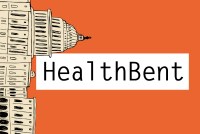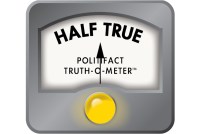Latest Morning Briefing Stories
What the Health? From KFF Health News: Digesting Trump’s Big Budget Law
President Donald Trump’s big budget bill became his big budget law on July 4, codifying about $1 trillion in cuts to the Medicaid program. But the law includes many less-publicized provisions that could reshape the way the nation pays for and receives health care. Meanwhile, at the Department of Health and Human Services, uncertainty reigns as both staff and outside recipients of federal funds face cuts. Rachel Roubein of The Washington Post, Tami Luhby of CNN, and Rachel Cohrs Zhang of Bloomberg News join KFF Health News’ Julie Rovner to discuss these stories and more. Also this week, Rovner interviews KFF Health News’ Julie Appleby, who reported the latest KFF Health News’ “Bill of the Month” feature, about some very pricey childhood immunizations.
Doulas, Once a Luxury, Are Increasingly Covered by Medicaid — Even in GOP States
Even as states brace for significant reductions in federal Medicaid funding over the next decade, conservative legislatures across the country are passing laws that grant doula access to Medicaid beneficiaries.
Insurers Fight State Laws Restricting Surprise Ambulance Bills
A Colorado bill banning surprise billing for ambulance rides passed unanimously in both legislative chambers, only to be met with a veto from the governor. As more states pass such legislation, some are hitting the same snag — concerns about raising premiums.
An Arm and a Leg: The Prescription Drug Playbook, Part II
In this second part of a two-part series on dealing with the high price of prescription drugs, experts share their insider tips.
Journalists Assess Health Impacts of Trump’s Megabill, Who Will Feel Them, and When
KFF Health News journalists made the rounds on national and regional media this week to discuss topical stories. Here’s a collection of their appearances.
What the Health? From KFF Health News: Trump’s Bill Reaches the Finish Line
The House on Thursday moved to approve the largest-ever cuts to federal safety net programs, the last step before the measure goes to President Donald Trump’s desk. After the Senate very narrowly passed the bill, House GOP leaders ushered it past resistance from conservatives wary of adding trillions to the federal debt and moderates concerned about its cuts to Medicaid. Meanwhile, Health and Human Services Secretary Robert F. Kennedy Jr. has continued to pursue his anti-vaccine agenda, despite promising that he would not. Alice Miranda Ollstein of Politico, Maya Goldman of Axios, and Sarah Karlin-Smith of the Pink Sheet join KFF Health News’ Julie Rovner to discuss these stories and more.
To Keep Medicaid, Mom Caring for Disabled Adult Son Faces Prospect of Proving She Works
A proposed work requirement would make Medicaid expansion enrollees prove they’re working or meet other criteria. Most already work, but millions are expected to lose coverage if the provision passes, many from red tape. A Missouri mother who cares for her disabled son would probably be subject to the rule.
GOP Governors Mum as Congress Moves To Slash Medicaid Spending for Their States
In 2017, when President Donald Trump tried to repeal Obamacare and roll back Medicaid coverage, Republican governors helped turn Congress against it. Now, as Trump tries again to scale back Medicaid, Republican governors — whose constituents stand to lose federal funding and health coverage — have gone quiet on the health consequences.
El megaproyecto de ley republicano supondrá más costos de salud para muchos estadounidenses
Esto, a su vez, perjudicaría las finanzas de hospitales, residencias de adultos mayores y centros de salud comunitarios, y podría obligarlos a reducir servicios y personal, hasta a cerrar instalaciones.
Republican Megabill Will Mean Higher Health Costs for Many Americans
Spending cuts hitting medical providers, Medicaid and Affordable Care Act enrollees, and lawfully present immigrants are just some of the biggest changes the GOP has in store for health care — with ramifications that could touch all Americans.
To Cut Medicaid, the GOP’s Following a Path Often Used To Expand Health Care
Republicans are attempting to use the budget reconciliation process to boost President Donald Trump’s priorities and reduce health coverage. That process has been used to pass nearly every major piece of health legislation for decades — except usually lawmakers use it to expand health care, not cut it, writes Julie Rovner.
In a First, Trump and GOP-Led Congress Prepare To Swell Ranks of US Uninsured
Fewer Americans will likely have health insurance, compromising their physical and financial health, as the Trump administration and GOP-controlled Congress weigh major changes to the Affordable Care Act and Medicaid. “The effects could be catastrophic,” one policy analyst predicts.
Journalists Break Down Reconciliation Bill, Vaccine Panel Meeting, and ‘Dobbs’ Anniversary
KFF Health News journalists made the rounds on national and local media recently to discuss topical stories. Here’s a collection of their appearances.
Thune Says Health Care Often ‘Comes With a Job.’ The Reality’s Not Simple or Straightforward.
Sixty percent of Americans have health insurance through their own workplace or someone else’s job. But not all employers provide health insurance or offer plans to all their workers. When they do, cost and quality vary widely, making Thune’s statement an oversimplification.
Too Sick To Work, Some Americans Worry Trump’s Bill Will Strip Their Health Insurance
Republicans claim 4.8 million Americans on Medicaid who could work choose not to. The GOP’s work-requirement legislation could sweep up disabled people who say they’re unable to hold jobs.
What the Health? From KFF Health News: Live From Aspen — Governors and an HHS Secretary Sound Off
In this special episode taped before a live audience at Aspen Ideas: Health, three former governors — one of whom also served as secretary of the Department of Health and Human Services — discuss how state and federal officials can work together to improve Americans’ health. Democrat Kathleen Sebelius, former Kansas governor and HHS secretary under President Barack Obama; Republican Chris Sununu, former New Hampshire governor; and Democrat Roy Cooper, former North Carolina governor, join KFF Health News’ Julie Rovner.
Dual Threats From Trump and GOP Imperil Nursing Homes and Their Foreign-Born Workers
Understaffed nursing homes face a workforce crisis if President Donald Trump and Republicans further curtail immigration and cut Medicaid.
‘We Need To Keep Fighting’: HIV Activists Organize To Save Lives as Trump Guts Funding
While Congress fails to stave off cuts to HIV care, community leaders in Mississippi and beyond race to limit the damage.
Federal Proposals Threaten Provider Taxes, Key Source of Medicaid Funding for States
Republican proposals to tighten the use of special taxes to fund Medicaid programs could deprive states of billions of dollars for safety net health care. In California, any such limit would come on top of Medicaid cuts proposed by California Democrats in response to a $12 billion state deficit.
What the Health? From KFF Health News: Supreme Court Upholds Bans on Gender-Affirming Care
The Supreme Court this week said Tennessee may continue to enforce its law banning most types of gender-affirming care for minors. The ruling is likely to greenlight similar laws in two dozen states. And the Senate is preparing to vote on a budget reconciliation bill that includes even deeper Medicaid cuts than the House version. Victoria Knight of Axios, Alice Miranda Ollstein of Politico, and Sandhya Raman of CQ Roll Call join KFF Health News’ Julie Rovner to discuss these stories and more.





















